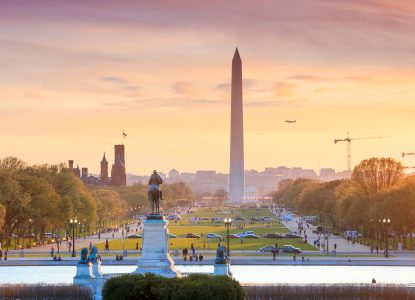By JoAnne Wadsworth, Communications Consultant, G20 Interfaith Forum
– – –
On Tuesday, June 28th, the G20 Interfaith Forum, together with ACWAY and the International Center for Law and Religion Studies (ICLRS), held a breakout session on religious freedom and the G20 at the 2022 International Religious Freedom Summit in Washington, D.C.
Panelists included Prof. W. Cole Durham, Jr., President of the G20 Interfaith Forum Association; Prof. Katherine Marshall, Vice-President of the G20 Interfaith Association, Senior Fellow at Georgetown University’s Berkley Center, and Executive Director of the World Faiths Development Dialogue; Audrey E. Kitagawa, Chair of the G20 Interfaith Forum Anti-Racism Initiative, Co-Chair of the IF20 Gender Equality Working Group, and President/Founder of the International Academy of Multicultural Cooperation; Rawaad Mahyub, Director of ACWAY; Riley Anderson, ACWAY Fellow; and Parth Bhansali, ACWAY Fellow.
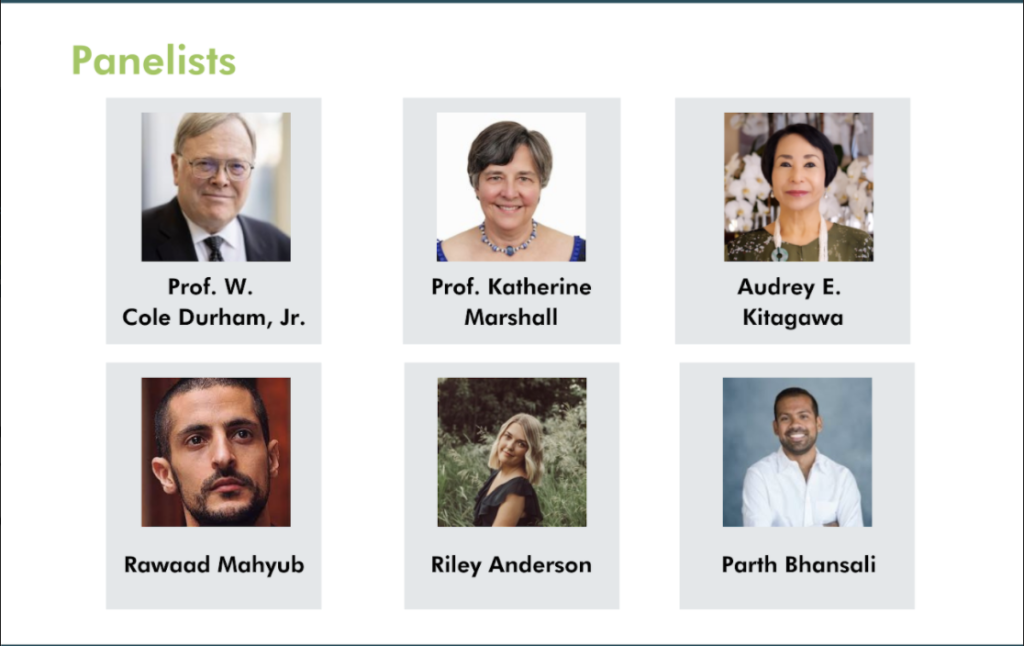
Cole Durham, Jr.
Durham began the session by welcoming all participants and guests, introducing the panelists, and giving a short explanation of the G20 Interfaith Forum’s mission and history. He then briefly addressed the central theme of the session: What’s the connection between FoRB (Freedom of Religion or Belief) and the G20? His answer looked at two points:
- Though the G20 process tends to focus on economics and finance, it is increasingly adding a focus on the UN’s Sustainable Development Goals (SDGs). Those include a broad range of issues on which religious communities can offer a tremendous amount of input (poverty, health, education, environment, etc.) It’s hard to imagine the SDGs being achieved on any level without the help of religious communities, but these communities are consistently overlooked.
- Religious communities can’t function on an optimal level if they don’t have religious freedom in their societies. FoRB is vital to enable religion to contribute to the other focuses of the G20.
He concluded by saying that FoRB tends to be underestimated as an important factor in world issues, and that it should be more thoroughly taken into account.
Katherine Marshall
Marshall focused her comments on how FoRB issues can be practically linked to global agendas, and seven points to keep in mind while attempting to work within that sphere:
- There is currently considerable tension between the Religious Freedom and Religious Engagement approaches. While Religious Engagement is typically quite positive, with a focus on reaching out and creating connections, Religious Freedom can easily become negative, with a focus on violations of that freedom.
- There are also some tensions and disconnects between human rights and religious freedom. Though FoRB is a core human right, religious freedom groups are often defensive of their priority and civil rights groups don’t know how to fit religious freedom into the mix.
- Some think there is not enough evidence of the legitimacy of religious groups’ work in global agenda issues, with the quality of some work not fully in tune with best practices.
- Some religious communities are preoccupied with instrumentalization; feeling like they’re being used and only brought in at the last minute as convenient workhorses.
- The data on religion is horribly complex, with some numbers being used widely in non-helpful ways. People don’t know what to do with these numbers: 84% of the world population being affiliated with a religious group, 83% of people living in countries where there are violations of religious freedom, etc.
- Many of the basic debates around global agendas turn on economics, which is currently not the strongsuit of religious communities. Religious actors need to become more comfortable engaging with the systems that are driving these policies.
- Religious issues are hugely complex, very dynamic, and very sensitive. We should find better ways to use numbers, evidence, and open dialogue to make progress rather than starting conversations with opinions based on personal belief.
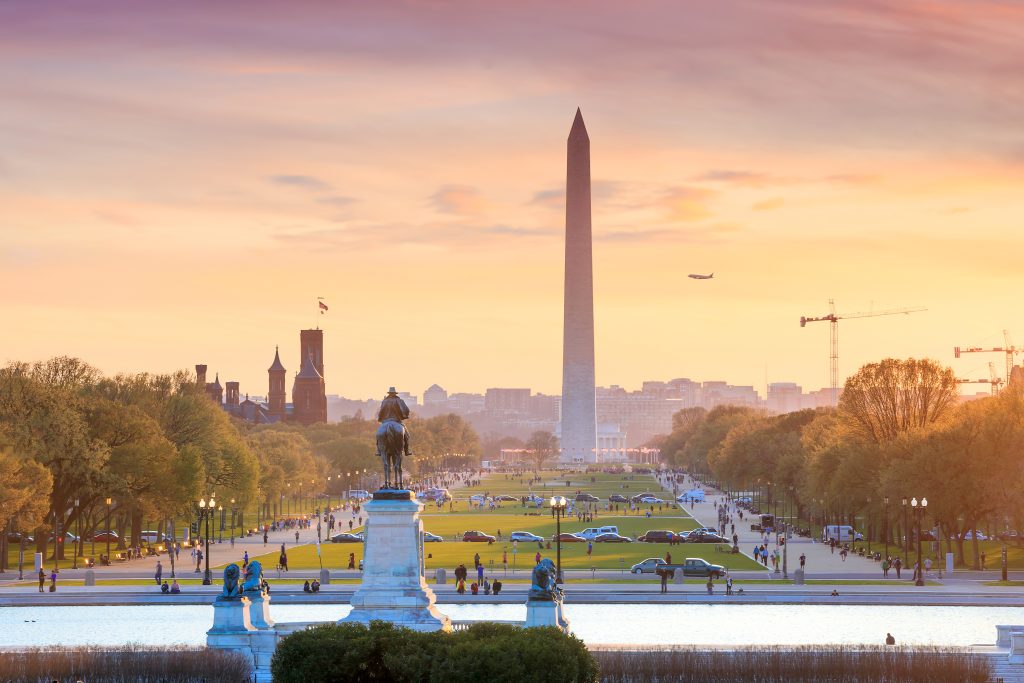
Audrey Kitagawa
Kitagawa focused her comments on the mission and work of the G20 Interfaith Forum’s Anti-Racism Initiative, which she leads. The G20 Interfaith Forum exists to facilitate constructive dialogue between faith leaders and others (community, political, academic, and civil leaders), foster communication channels between different faiths, and contribute to policy in global agendas, particularly related to the SDGs. As racism exists in and affects every global issue with which the G20 Interfaith Forum is concerned, the Anti-Racism Initiative strives to educate on and eliminate prejudice and discrimination in all of those areas.
“Racism is a problem with a long, painful, and complex history. It remains a deeply ingrained, substantial, and systemic problem on many levels. As such, we need to remain sensitive to the fact that racism is a cross-cutting issue that affects all of the SDGs and more.”
Some of the Anti-Racism’s work includes monthly webinars addressing racism against a wide variety of groups. The initiative will continue to grow, providing a variety of educational materials and striving to speedily eliminate racial discrimination on every front.
Rawaad Mahyub
Mahyub began by introducing ACWAY – a global youth movement that currently involves over 180 young people from more than 85 countries, helping them engage with their communities by planning interfaith projects throughout the world, and thus far has delivered over 200 grassroots activities. The organization strives to inspire and support young people to be part of the interfaith sector by:
- Organizing global forums to bring young people together from around the world and provide training and connection opportunities
- Supporting young people in delivering local interreligious and intercultural activities
- Providing them with a platform to share their voices, experiences, and stories in the interfaith sector
He then introduced their flagship initiative: The Interfaith Development Goals (IDGs).
“The IDGs were initiated by ACWAY to fill a small but important gap in the UN’s SDGs. There’s a lot of work to be done in terms of capturing evidence and results of the quality work we do in the interfaith sector. The IDGs allow us to capture and demonstrate how religious, faith, spiritual and interfaith groups, their communities, and their leaders contribute to building peace and harmony around the world.”
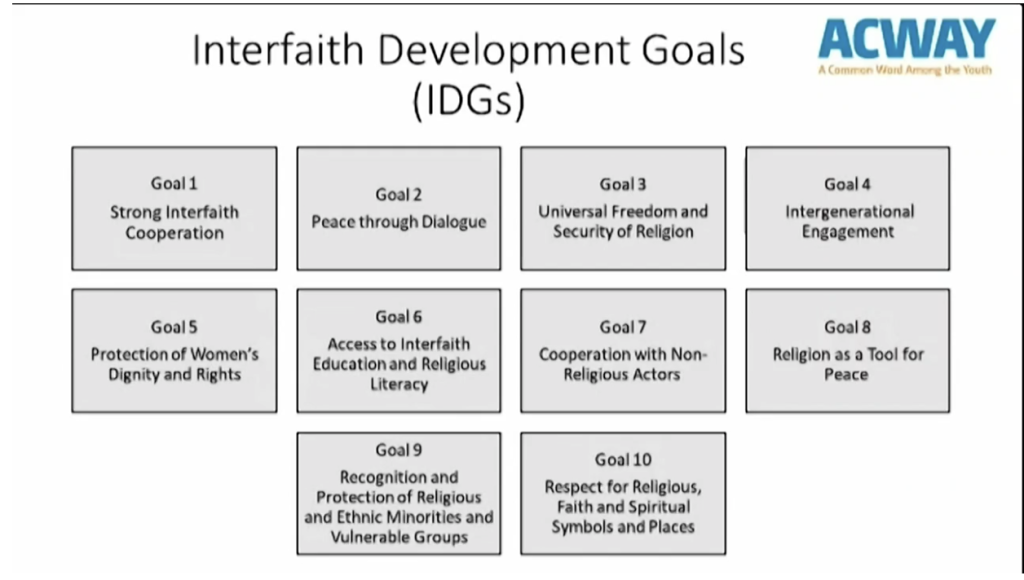
Riley Anderson
Anderson shared her experiences as a fellow in the ACWAY program, talking about her time at the 2021 G20 Interfaith Forum in Bologna, Italy, and the interfaith activity she organized on her college campus afterwards. She also spoke about how our religious, personal and nationality-based beliefs are intertwined, and how it is important to have religious freedom so that everyone can be at peace no matter where their beliefs stem from.
She said she’d learned a few important things from her time working in the interfaith sector:
“Young people are more interested in interfaith work than most people assume. And differences are just as important as similarities when we’re dialoguing with each other and learning to work together.”
Parth Bhansali
Bhansali also shared his experiences with ACWAY, focusing on how today’s world is changing, making way for more consideration of diversity – even diversity of faith. He said when he got his first job after college, he’d been excited about how nice the break room was. Now, his friends were excited that they get Hannukah off on paid leave.
However, he said that this new world is often being shaped without the input of young people.
“We’re missing the voice of youth when connecting with decision-makers. Let’s give them a voice. Let’s work together to bridge gaps of understanding.”
He ended by highlighting how the power of the ACWAY network has helped create opportunities and friendships, as well as how the ACWAY fellows from different industries are leaning on each other to create, educate, and empower through the activities they’re running.
Conclusion
The session ended with a short Q&A, then panelists were invited to offer closing remarks. After the final statements, the session was concluded.
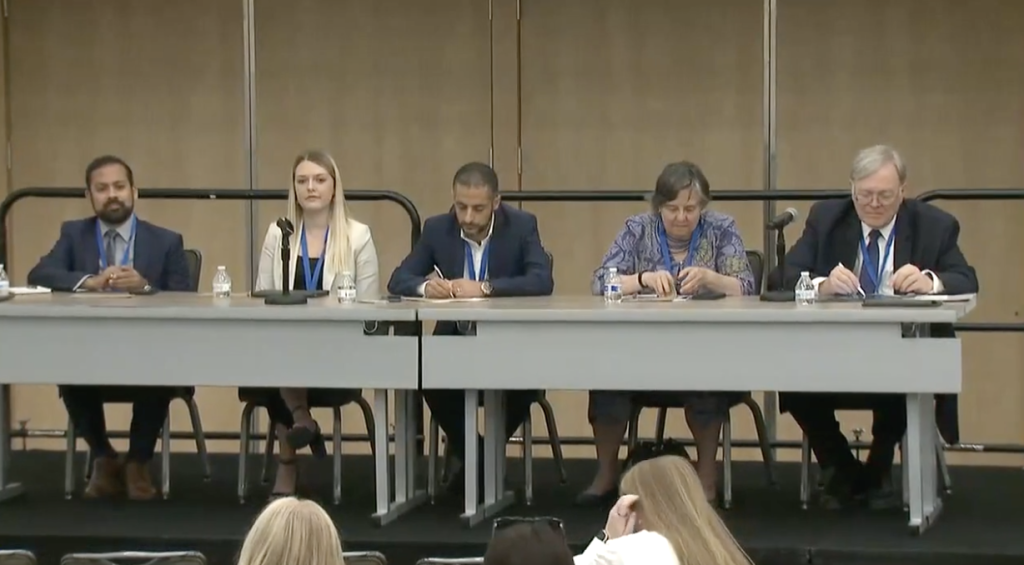
– – –
JoAnne Wadsworth is a Communications Consultant for the G20 Interfaith Association and acting editor of the “Viewpoints” blog.


